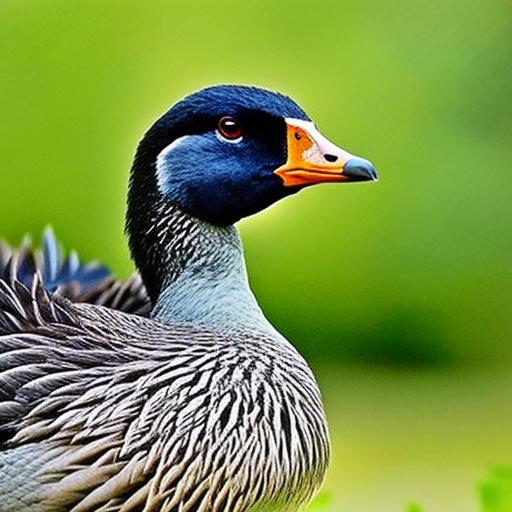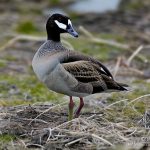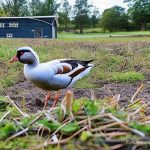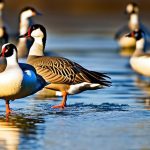Geese are known for their strong migratory instincts and their tendency to return to the same nesting and feeding grounds year after year. They are also highly social animals, often traveling in large flocks and communicating with each other through honking and other vocalizations. Understanding these behaviors is crucial when it comes to managing and deterring geese from unwanted areas.
Geese are also highly protective of their nesting sites and can become aggressive when they feel threatened. This is especially true during the breeding season when they are nesting and raising their young. It’s important to keep in mind that geese are simply trying to protect their offspring and are not inherently aggressive animals. By understanding their behavior and motivations, it becomes easier to find humane and effective ways to deter them from unwanted areas.
Key Takeaways
- Geese are territorial and can become aggressive when they feel threatened or when protecting their nests and young.
- Physical barriers such as fences, netting, and hedges can effectively deter geese from entering certain areas.
- Sound deterrents like propane cannons and visual deterrents like scarecrows and reflective tape can help keep geese away from properties.
- Natural repellents like grape seed extract and garlic-based sprays can be used to discourage geese from frequenting certain areas.
- Removing attractive food sources such as open garbage cans and spilled birdseed can help reduce the presence of geese in an area.
- Establishing a no-tolerance policy for feeding geese and enforcing it consistently can help discourage their presence.
- Seeking professional assistance from wildlife control experts can provide effective and humane solutions for managing geese-related issues.
Creating Physical Barriers
One of the most effective ways to deter geese from a specific area is by creating physical barriers that prevent them from accessing it. This can include installing fences, hedges, or other structures that make it difficult for geese to land or walk onto the property. It’s important to ensure that these barriers are tall enough to prevent geese from flying over them and sturdy enough to withstand their attempts to push through or knock them down.
Another physical barrier that can be effective in deterring geese is the use of floating barriers on bodies of water. These barriers can be placed strategically to prevent geese from accessing certain areas, such as swimming pools or ponds. By creating physical barriers, property owners can effectively discourage geese from settling in unwanted areas without causing them harm.
Using Sound and Visual Deterrents
In addition to physical barriers, sound and visual deterrents can also be effective in deterring geese from specific areas. One common method is the use of predator decoys, such as fake coyotes or dogs, which can create the illusion of danger and discourage geese from settling in the area. These decoys should be moved regularly to prevent geese from becoming accustomed to them.
Another effective deterrent is the use of sound devices that emit loud noises or distress calls of geese in distress. These sounds can create a sense of danger and encourage geese to move on to a safer location. It’s important to note that these devices should be used sparingly and in compliance with local noise ordinances to avoid causing unnecessary disturbance to neighbors.
Implementing Natural Repellents
Natural repellents can also be effective in deterring geese from specific areas without causing them harm. One common natural repellent is the use of grape seed extract, which can be sprayed on grass and other vegetation to make it less appealing to geese. Another natural repellent is the use of garlic or hot pepper spray, which can be applied to grass and other surfaces to deter geese from feeding in the area.
It’s important to note that natural repellents may need to be reapplied regularly, especially after rain or watering, to remain effective. Additionally, it’s important to choose natural repellents that are safe for the environment and other wildlife in the area.
Removing Attractive Food Sources
Geese are attracted to areas with abundant food sources, such as grass, grains, and aquatic plants. By removing these attractive food sources, property owners can effectively discourage geese from settling in unwanted areas. This can include regularly mowing grass to keep it short, removing spilled birdseed or pet food, and using netting or other barriers to prevent geese from accessing crops or other food sources.
It’s important to note that removing attractive food sources should be done in a way that does not harm other wildlife or disrupt the local ecosystem. Property owners should also be mindful of local regulations and guidelines when it comes to managing vegetation and food sources on their property.
Establishing a No-Tolerance Policy

In some cases, property owners may need to establish a no-tolerance policy when it comes to geese on their property. This can include implementing measures such as hazing techniques, which involve using non-harmful methods to discourage geese from settling in the area. Hazing techniques can include using trained dogs, motion-activated sprinklers, or other methods to create a sense of danger and encourage geese to move on.
It’s important for property owners to be consistent and persistent when implementing a no-tolerance policy for geese. By sending a clear message that the area is not a safe or welcoming environment for geese, property owners can effectively discourage them from settling in unwanted areas.
Seeking Professional Assistance
In some cases, managing and deterring geese from unwanted areas may require professional assistance. There are wildlife management companies and professionals who specialize in humane and effective methods for managing geese populations. These professionals can assess the specific needs of a property and develop a customized plan for deterring geese in a way that is safe for both the animals and the environment.
Professional assistance may also be necessary for properties with large or persistent geese populations, as well as for properties located near protected wetlands or other sensitive habitats. By seeking professional assistance, property owners can ensure that they are using the most effective and humane methods for managing geese populations on their property.
In conclusion, understanding the behavior of geese is crucial when it comes to managing and deterring them from unwanted areas. By implementing physical barriers, sound and visual deterrents, natural repellents, and removing attractive food sources, property owners can effectively discourage geese from settling in specific areas without causing them harm. Establishing a no-tolerance policy and seeking professional assistance when necessary can also help property owners manage geese populations in a way that is safe for both the animals and the environment.
Looking for effective ways to keep geese out of your yard? Check out this insightful article on PoultryWizard.com that offers valuable tips and strategies for managing geese in your outdoor space. Whether it’s using physical barriers, natural deterrents, or other methods, this article provides practical advice to help you maintain a goose-free yard. For more helpful poultry-related content, be sure to explore their other articles on topics such as chicken coop door size and quail diet and nutrition.
FAQs
What are some effective methods for keeping geese out of my yard?
Some effective methods for keeping geese out of your yard include installing physical barriers such as fences or netting, using scare tactics such as decoys or noise makers, and applying repellents or deterrents to the area.
Are there any natural deterrents that can be used to keep geese away from my yard?
Yes, there are natural deterrents that can be used to keep geese away from your yard. These include planting tall grasses or shrubs around the perimeter of your yard, as well as using natural repellents such as citrus sprays or predator urine.
What should I do if I encounter a nesting goose in my yard?
If you encounter a nesting goose in your yard, it is best to give the goose plenty of space and avoid disturbing the nest. It is also important to check local regulations before attempting to relocate the nest, as some species of geese are protected by law.
Are there any humane methods for keeping geese out of my yard?
Yes, there are humane methods for keeping geese out of your yard. These include using non-lethal deterrents such as visual scare tactics or noise makers, as well as creating an environment that is less attractive to geese by removing food sources and nesting sites.
What are some potential risks associated with geese in my yard?
Some potential risks associated with geese in your yard include damage to landscaping and gardens, aggressive behavior towards pets or humans, and the spread of diseases such as avian influenza. It is important to address any issues with geese in a safe and responsible manner.
Meet Walter, the feathered-friend fanatic of Florida! Nestled in the sunshine state, Walter struts through life with his feathered companions, clucking his way to happiness. With a coop that’s fancier than a five-star hotel, he’s the Don Juan of the chicken world. When he’s not teaching his hens to do the cha-cha, you’ll find him in a heated debate with his prized rooster, Sir Clucks-a-Lot. Walter’s poultry passion is no yolk; he’s the sunny-side-up guy you never knew you needed in your flock of friends!







